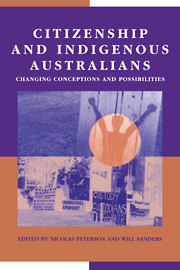1 - Introduction
Published online by Cambridge University Press: 23 September 2009
Summary
Citizenship defines the membership of a common society and the rights and duties of that society's members. ‘Citizenship’ is usually used for ‘membership’ in a state society where there is a strong emphasis on individual rights as a result of the development of commoditisation and the economy. Throughout this book the word ‘citizenship’ is sometimes used in the looser sense of full membership in any society.
For most of Australia's colonial history the great majority of Aboriginal people and Torres Strait Islanders have been denied full membership of Australian society and consequently the rights and equal treatment that other Australians take for granted. Further, the settler society has, since the earliest decades of colonisation, ignored the existence in Australia of indigenous societies or social orders, which have provided, and continue to provide, the first locus of social membership and identity for most Aboriginal people. The fact that, after a long hard struggle, indigenous people finally secured full formal equal rights within the encapsulating settler society in the 1960s, gaining access to the same set of citizenship rights as non-indigenous Australians, was a vital step, but the question of the recognition of membership in their own indigenous social orders remains unaddressed.
The failure of the colonists to recognise, at the outset of colonisation, the rights of the people who were here first has left not only a moral and legal taint on the nation's title to the country but also many unanswered questions about the articulation of settler and indigenous societies.
- Type
- Chapter
- Information
- Citizenship and Indigenous AustraliansChanging Conceptions and Possibilities, pp. 1 - 32Publisher: Cambridge University PressPrint publication year: 1998
- 2
- Cited by

